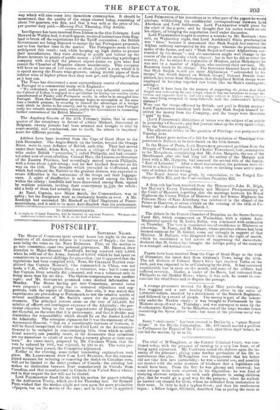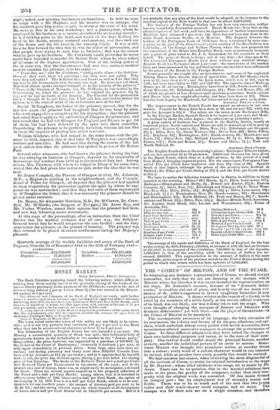The trial of M'Naughten, at the Central Criminal Court, was
con- tinued today, with the prcspect of running to a very late hour, or of being again adjourned. Mr. Cockburn rested the defence upon the in- sanity of the prisoner ; giving some further particulars of his life to corroborate that plea. 31‘Naughten was disappointed that his father did not take him into partnership : he was a natural son, and possibly not treated with the same measure of kindness that a legitimate son would have been. From the first he was gloomy and reserved ; but some strange traits were observed in his disposition : he was fond of studying abstruse subjects ; he took such pleasure in seeing children play, that be would go a good way for the purpose ; when he walked, he carried out crumbs for birds, whom be defended from molestation in their nests. In 1834 he had a typhus fever ; and then his restlessness began : a fellow lodger, Gilchrist, described him as pacing the room at
night, nuked, and uttering incoherent exclamations. In 1837 he went to lodge with a Mr. Hughes ; and his manner was so strange, that his landlord gave him notice to quit, in alarm at the state of his mind. He went to live in his own workshop ; and a journeyman, whom he employed in his business as a turner, remarked his increasing disorder : he had racking pains in the head, and would sit for days bolding his bead in his hands, uttering tortured exclamations, and then rush out of the house and dip his head in the running Clyde. It was at this time be first formed the idea that he was the object of persecution, and that people were trying to ruin him in business : that was the reason why be gave up his business. Mr. Cockburn would prove that he never could have intended to murder Sir Robert Peel; whom be often talked of in terms of the highest approbation. One of the telling points of the de ence was, that the Government had sent two eminent medical men to examine the prisoner es to his sanity — " There they are," said Mr. Cockburn, "sitting at the elbow if the Solicitor. General : they were there al yesterday ; but they were not called. Why were they not called ? The Solicitor-General knows as well as I do that they reported to the Government that the man was mad. Ile dares net call them. But their silence speaks trumpet-tongued as to the insanity of the prisoner." "There is the Surgeon of Newgate, too, Mr. M'Murdo, be was desired by the Government, to. watch the prisoner: he has watched the prisoner, day by day, and he has no doubt of his insanity. The Counsel for the prosecution has n t thought fit to call him ; but I will call him, and let him deliver his opinion as to the state of mind of the unfortunate man at the bar."
Daniel M‘Naughten, the father of the prisoner, proved, that for the last few years the prisoner had imagined that he was beset by spies, who were engaged in a conspiracy for his destruction : that the prisoner had asked him to apply to the authorities of Glasgow for protection; and had stated that he had left Glasgow for England and France to get rid of them, but had been followed by the spies into those countries. Considering the prisoner to be perfectly harmless, mitten did not like to incur the expense of placing him under restraint.
- William Gilchrist, who had lodged in the same house with the pri- soner in 1834, deposed, that at that time M'Naughten was exceedingly restless and unsettled. He had seen him during the course of the last year, and at that time the prisoner had spoken in praise of Sir Robert Peel.
Several other witnesses, who had known the prisoner during the time he was carrying on business at Glasgow, deposed to the singularity of demeanour and conduct from 1834 up to the month of July last. Among others, Mrs. Paterson, with whom he lodged in Glasgow for some time, stated that she had given him notice to quit, under the idea that he was mad.
Sir James Campbell, the Provost of Glasgow in 1842, Mr. Johnston, M.P., a Magistrate residing in the neighbourhood, and the Commis- sioner of Police for Glasgow, all deposed that the prisoner had applied to them respectively for protection against the spies by whom be sup- posed she was surrounded ; and that they had each of them represented to M`Naughten the father, that it was necessary the prisoner should be pLeed under restraint.
Dr. Monro, Sir Alexander Morrison, M.D., Dr. M'Clewer, Dr. Craw- furd, Mr. M`Murdo, (the Surgeon of Newgate,) Mr. Aston Key, and Mr. Forbes Winslow, stated their opinion that the prisoner had been, and now was, labouring under monomania.
At this stage of the proceedings, after an intimation from the Chief Justice that the medical evidence was all one way, the Solicitor- General stated that be would not pursue the case further : and the Jury ActaturrRn the prisoner, on the ground of insanity. The prisoner was then ordered to be placed in secure confinement during her Majesty's pleasure.



























 Previous page
Previous page